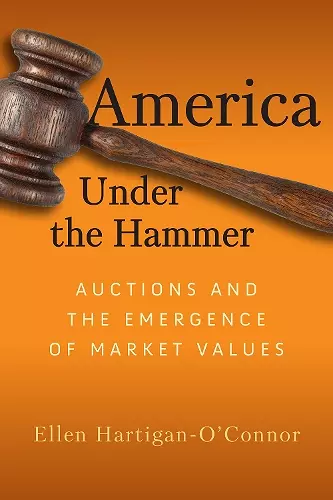America Under the Hammer
Auctions and the Emergence of Market Values
Ellen Hartigan-O'Connor author
Format:Hardback
Publisher:University of Pennsylvania Press
Published:12th Nov '24
Currently unavailable, and unfortunately no date known when it will be back

Reveals how, through auctions, early Americans learned capitalism
As the first book-length study of auctions in early America, America Under the Hammer follows this ubiquitous but largely overlooked institution to reveal how, across the eighteenth and early nineteenth centuries, price became an accepted expression of value. From the earliest days of colonial conquest, auctions put Native land and human beings up for bidding alongside material goods, normalizing new economic practices that turned social relations into economic calculations and eventually became recognizable as nineteenth-century American capitalism.
Starting in the eighteenth century, neighbors collectively turned speculative value into economic “facts” in the form of concrete prices for specific items, thereby establishing ideas about fair exchange in their communities. This consensus soon fractured: during the Revolutionary War, state governments auctioned loyalist property, weaponizing local group participation in pricing and distribution to punish political enemies. By the early nineteenth century, suspicion that auction outcomes were determined by manipulative auctioneers prompted politicians and satirists to police the boundaries of what counted as economic exchange and for whose benefit the economy operated. Women at auctions—as commodities, bidders, or beneficiaries—became a focal point for gendering economic value itself. By the 1830s, as abolitionists attacked the public sale of enslaved men, women, and children, auctions had enshrined a set of economic ideas—that any entity could be coded as property and priced through competition—that have become commonsense understandings all too seldom challenged.
In contrast to histories focused on banks, currencies, or plantations, America Under the Hammer highlights an institution that integrated market, community, and household in ways that put gender, race, and social bonds at the center of ideas about economic worth. Women and men, enslaved and free, are active participants in this story rather than bystanders, and their labor, judgments, and bodies define the resulting contours of the American economy.
"Hartigan-O’Connor presents an astute exploration of auctions in the U.S. during the 18th and 19th centuries. Her book references parallel behaviors in England and reminds readers that colonists wanted to profit from their transactions. She explores the relationship among auctions, auctioneers, bidders, and bystanders, all of which creates a palpable picture of the nation’s early economic climate... Well written and full of refreshing details, this economic picture of the early United States is a must for readers." * Library Journal (starred review) *
"America Under the Hammer is a fascinating, deeply researched, and impressive book. In it, Ellen Hartigan-O’Connor reveals how auctions stood at the center of nation-making, were central to the rise of American capitalism, and helped shape early American ideas about freedom, slavery, gender, and race. This excellent book is essential reading for anyone interested in an economic history of America that positions individuals across race, gender, age, and geographic divides at the center of its analysis." * Stephanie E. Jones-Rogers, author of They Were Her Property: White Women as Slave Owners in the American South *
"Ellen Hartigan-O’Connor skillfully recovers the countless human stories drowned out by the auctioneer’s bark and the bang of his gavel. This smart and elegant book explodes market mythologies and confronts the social and cultural forces that made the auction room a site of both possibility and tragedy. Refusing the simple equation of price and value, America Under the Hammer is immediately atop my list of the best books on early American capitalism." * Seth Rockman, author of Plantation Goods: A Material History of American Slavery *
"In this thoughtful, engaging book, Ellen Hartigan-O’Connor examines how public auctions in eighteenth- and early nineteenth-century America became a place where ordinary citizens painstakingly began to build new regimes of value in which anything and everything could, in the end, have a price. Far from being the product of impersonal economic forces, these acts of collective valuation always remained social, even political, acts that resonated long after the auctioneer’s hammer came down." * Stephen Mihm, author of A Nation of Counterfeiters: Capitalists, Con Men, and the Making of the United States *
ISBN: 9781512826517
Dimensions: unknown
Weight: unknown
256 pages